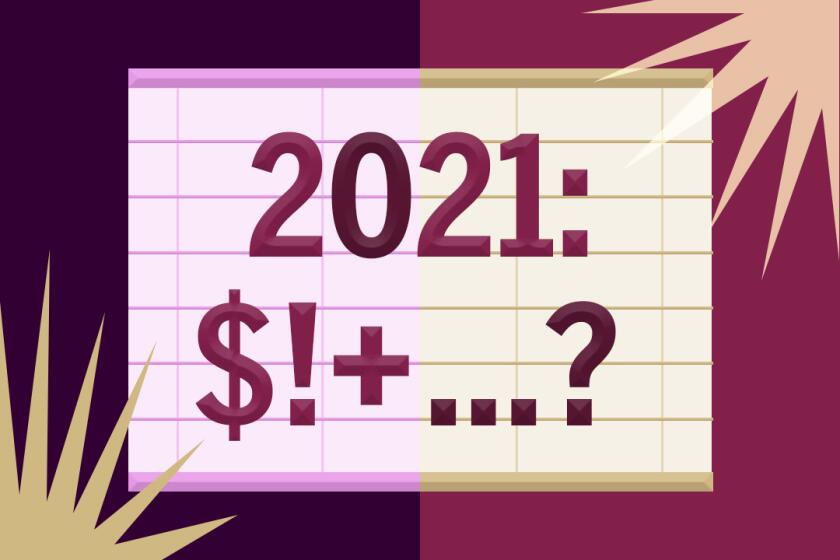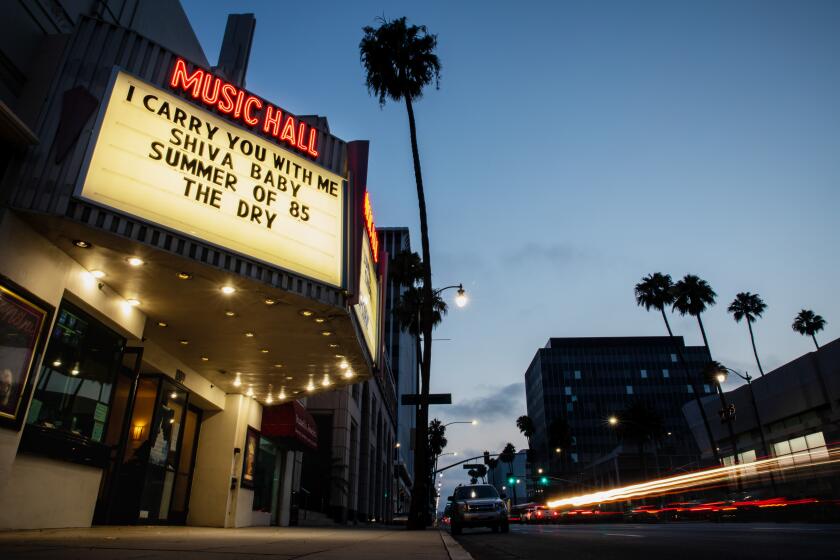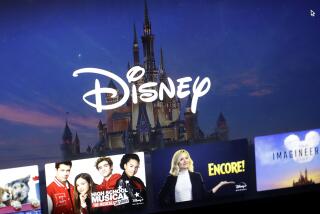Theaters hate Disney’s ‘Black Widow’ at-home release. But did it work?

The opening weekend for “Black Widow” was widely seen as a success for Walt Disney Co. and a possible sign that theaters and online viewing can coexist, at least for some movies.
Along with its $80 million in box office receipts from the U.S. and Canada, the studio reported $60 million in grosses from Disney+, where the Marvel movie was available to watch for a $30 upcharge on the same day as its theatrical release.
Inside the business of entertainment
The Wide Shot brings you news, analysis and insights on everything from streaming wars to production — and what it all means for the future.
You may occasionally receive promotional content from the Los Angeles Times.
The second weekend, however, revived a debate in Hollywood as media companies and audiences increasingly gravitate toward digital options. How sustainable is it for studios to release films simultaneously at home and in theaters rather than giving multiplexes the weeks of breathing room they’re used to?
From exhibitors’ point of view, not very. Theaters clearly believe that such tactics will harm their business, and the evidence is growing to support that claim. In its second weekend, “Black Widow” collected $26.3 million Friday through Sunday, representing a 67% drop. That’s a steep decline for a Marvel movie and a clear indication that the film’s availability online ate into its box office, analysts said.
“There’s no question the film’s box office trajectory is running below average for Marvel and for other current wide releases,” said David A. Gross, who runs Franchise Entertainment Research, a movie consultancy. “The market is still unsettled in a lot of ways, but in this case the simultaneous streaming, the holdback from a China release date and rampant piracy are hurting the film — badly.”
We launched The Wide Shot six months ago with some with big questions and light predictions for Hollywood’s 2021. How’ve we done so far?
Notably, Disney did not report online sales numbers for week two.
Advocates for theaters pounced. The National Assn. of Theatre Owners, a Washington-based trade organization, issued a lengthy statement on Sunday criticizing Disney’s release plan, saying the tactic cannibalized theatrical revenues and spurred piracy.
“The many questions raised by Disney’s limited release of streaming data opening weekend are being rapidly answered by ‘Black Widow’s’ disappointing and anomalous performance,” said the group, which had previously held its tongue about Disney’s same-day releases. “The most important answer is that simultaneous release is a pandemic-era artifact that should be left to history with the pandemic itself.”
But will it?
NATO’s salvo against Disney was remarkable in part because the studio had, until the pandemic, been the most reliable supplier of hit movies for cinemas. So much so that Disney has been able to extract stiffer terms from theaters for its big movies than have other studios, generally keeping 60% of the revenue from ticket sales and sometimes an even bigger cut.
Would the group have spoken up if Disney had not declared victory with its $60 million in sales from Disney+? Perhaps not. NATO may have seen Disney’s release of its Disney+ numbers as a shot across the bow. The group spoke favorably about Paramount’s “A Quiet Place Part II” and Universal’s “F9: The Fast Saga,” first released only in theaters.
Disney’s business model has changed dramatically in the last year and a half to focus on direct-to-consumer businesses including Disney+, which launched in 2019 to compete with Netflix. Despite COVID-19 restrictions doing massive damage to its businesses, including theme parks, Disney’s stock has traded at lofty levels thanks to the growth of Disney+ and Hulu.
Disney did not respond to a request for comment.
Disney’s risky “Black Widow” move may have been worth it, at least in the short-term, according to a Monday report from Cowen & Co. analyst Doug Creutz, who has been closely following the debate over theatrical releases and premium video on demand (or PVOD).
The $70-million opening weekend for ‘F9’ gives theatrical traditionalists reason to cheer. But ‘normal’ is still very far away.
On one hand, Cowen & Co. estimates that the hybrid release strategy will decrease “Black Widow’s” domestic box office by $50 million to $70 million through its first 10 days of release, marking a haircut of 35% from what the movie might have made from a normal rollout based on similar Marvel films. “Black Widow” has grossed $132 million domestically so far.
Yet the dual release “was almost certainly still a positive trade off,” Creutz wrote.
Theaters such as the Lumiere Cinema at the Music Hall, Alamo Drafthouse, Landmark Theatres and Laemmle Theatres try to rebound as they wait for big indie releases.
How so? Of the $60 million generated from Disney+ premier access, just 15% goes to distribution partners including Apple and Google, compared with the 40% of box office that goes to theaters. With that, Cowen estimates that Disney would be losing out on money overall only if it lost 4.25 tickets for each domestic video-on-demand purchase. According to Cowen, it probably loses 2.5 to 3.5 tickets for each on-demand sale.
Still, it’s uncertain how Disney will use its premier access strategy after this year. The upcoming “Jungle Cruise” starring Dwayne Johnson and Emily Blunt will be released with the same dual plan as “Black Widow.”
However, Disney has committed to debuting Marvel’s “Shang-Chi and the Legend of the Ten Rings” with a 45-day exclusive theatrical window before it’s available in the home. Before COVID-19, theaters got an average window of about 74 days before video on demand.
The theater group’s Sunday statement rejected the notion that the simultaneous releases make financial sense for Disney, arguing that Disney+ revenue cannibalizes later video-on-demand sales.
Disney will ultimately decide what’s good for its business. And it’s not the only studio that’s been experimenting.
Warner Bros. just released “Space Jam: A New Legacy” in theaters and on HBO Max at the same time, the latest in its controversial 2021 streaming strategy. The new “Space Jam” unseated “Black Widow” at No. 1 with a surprisingly strong $31.7 million.
But Creutz argued that Disney and other studios should consider the long-term damage that could result from a diminished theatrical market waging a tenuous recovery from closures, capacity restrictions and worries about the Delta variant. Movie ticket sales remain below pre-pandemic levels.
“If the theatrical footprint were to shrink significantly, Disney’s overall box office would likely take a more damaging hit, one that potentially can not be covered by PVOD [premium video on demand,” Creutz wrote. “While Disney only has one more film on its slate scheduled for a dual-window release ... they (and their peers) are going to have to do some serious thinking about the best long-term strategy to protect overall film economics.”
More to Read
Inside the business of entertainment
The Wide Shot brings you news, analysis and insights on everything from streaming wars to production — and what it all means for the future.
You may occasionally receive promotional content from the Los Angeles Times.














